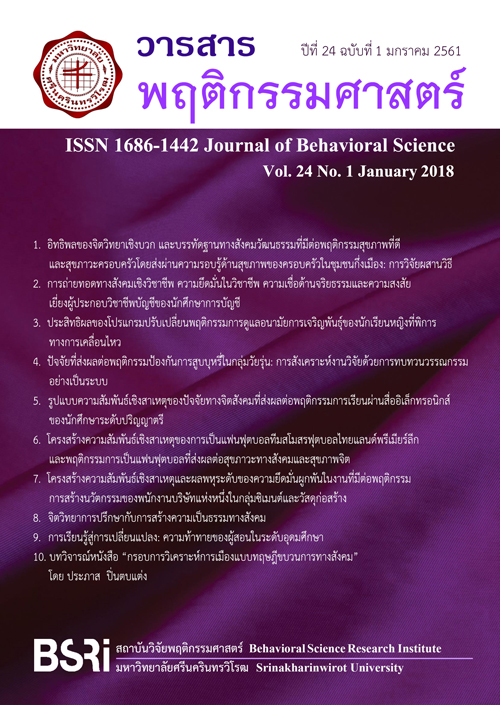อิทธิพลของจิตวิทยาเชิงบวก และบรรทัดฐานทางสังคมวัฒนธรรมที่มีต่อพฤติกรรมสุขภาพที่ดีและสุขภาวะครอบครัวโดยส่งผ่านความรอบรู้ด้านสุขภาพของครอบครัวในชุมชนกึ่งเมือง: การวิจัยผสานวิธี
Keywords:
Causal Relationship Model, Positive Psychology, Cultural Social Norm, Healthy Behavior, Health Literacy, Family Well-being, สุขภาวะครอบครัว, ความรอบรู้ด้านสุขภาพ, พฤติกรรมสุขภาพ, บรรทัดฐานทางสังคมวัฒนธรรม, จิตวิทยาเชิงบวก, รูปแบบความสัมพันธ์เชิงสาเหตุAbstract
การวิจัยผสานวิธีครั้งนี้มีวัตถุประสงค์เพื่อ 1) ทำความเข้าใจบริบททางจิตวิทยาสุขภาพครอบครัวและชุมชนที่เป็นสาเหตุเงื่อนไขของพฤติกรรมสุขภาพครอบครัว 2) ค้นหาอิทธิพลของปัจจัยที่มีต่อสุขภาวะครอบครัวที่ดีโดยส่งผ่านความรอบรู้ด้านสุขภาพและพฤติกรรมสุขภาพของคู่สมรสในชุมชนกึ่งเมือง และ 3) เปรียบเทียบรูปแบบความสัมพันธ์เชิงสาเหตุระหว่างคู่สมรสเพศหญิงกับเพศชายโดยเก็บข้อมูลเชิงคุณภาพด้วยการสัมภาษณ์เชิงลึกกับ
คู่สมรสเจ้าหน้าที่สาธารณสุข ผู้นำชุมชน และอาสาสมัครประจำหมู่บ้านรวม 10 คน และเก็บข้อมูลเชิงปริมาณกับของคู่สมรสเพศหญิง 200 คน และเพศชาย 213 คนรวม 413 คน จากแบบสอบถามที่มีค่าความเชื่อมั่นสูงมีค่าอยู่ระหว่าง 0.72–0.92 ผลการศึกษาพบว่า 1) ผลเชิงคุณภาพ พบว่า การมีสุขภาพดีของคู่สมรสนั้นมาจากการให้ความสำคัญ ใส่ใจสุขภาพและดำรงชีวิตภายใต้เงื่อนไขอยู่กับธรรมชาติดั้งเดิม เช่น ประกอบอาหารรับประทานเองจากวัตถุดิบในท้องถิ่นที่ปลูกเอง เลี้ยงเอง เป็นต้น เคลื่อนไหวออกกำลังกายเสมอ สนทนาพูดคุยกับเพื่อนบ้านแสวงหาความรู้จากหนังสือและสอบถามเจ้าหน้าที่สาธารณสุข และ 2) ผลเชิงปริมาณ พบว่า 2.1) รูปแบบความสัมพันธ์เชิงสาเหตุด้านจิตวิทยาเชิงบวก และบรรทัดฐานทางสังคมวัฒนธรรมที่มีต่อสุขภาวะครอบครัวโดยส่งผ่านความรอบรู้ด้านสุขภาพและพฤติกรรมสุขภาพของคู่สมรส มีความสอดคล้องกับข้อมูลเชิงประจักษ์ (c2=95.23, df=78, p-value= 0.09, c2/df=1.22, RMSEA=0.02, SRMR=0.03, GFI=0.96, CFI=1.00, NFI=0.99) โดยปัจจัยทั้งหมดสามารถทำนายพฤติกรรมสุขภาพได้ร้อยละ 72 ทำนายสุขภาวะครอบครัวได้ร้อยละ 51 และ 2.2) ปัจจัยที่มีอิทธิพลทางตรงต่อสุขภาวะครอบครัว มากที่สุด คือ จิตวิทยาเชิงบวก (ค่า β เท่ากับ 0.48, *p< 0.05) รองลงมา คือ พฤติกรรมสุขภาพ (ค่า β เท่ากับ 0.32, *p< 0.05) 3) ผลวิเคราะห์ความไม่แปรเปลี่ยน
ของรูปแบบความสัมพันธ์เชิงสาเหตุระหว่างกลุ่มคู่สมรสเพศหญิงกับคู่สมรสเพศชายพบว่า ไม่แตกต่างกัน แต่เมื่อเปรียบเทียบค่าเฉลี่ยตัวแปรแฝงพบว่า มีค่าเฉลี่ยแตกต่างกันระหว่างเพศคือ ตัวแปรพฤติกรรมสุขภาพเพียงตัวเดียว โดยเพศหญิงมีค่าเฉลี่ยต่ำกว่าเพศชาย ส่วนตัวแปรแฝงอื่นนั้นพบว่า ค่าเฉลี่ยไม่มีความแตกต่างกันระหว่างคู่สมรสเพศหญิงและเพศชาย
Effect of Positive Psychology and Cultural Social Norm on Healthy Behavior and Family Well-being by Mediated by Health Literacy of Family in the Semi-Urban Community: Mixed Methods
This mixed methods research aims to 1) understand the health psychology context of semi-urban community that cause or condition healthy behaviors through studying adult family members; and 2) develop and compare the causal relationship models of healthy behavior and family well-being by the mediating effect of health literacy of spouses between female and male. There were 10 persons who were spouses, health providers, community leader and public health volunteers by in-depth interview. The samples included 413 spouses as 200 females and 213 males using to analyze in a questionnaire with reliability of .72–.92. The results: 1) For qualitative data showed that the healthy lifestyle of the spouse comes from paying attention to health based on the original way of natural life in community such as self-cooking by locally grown ingredients, self-cultivation, always exercise, a conversation with neighbors and seeking knowledge from the book or the public health officer. 2) For quantitative data: 2.1) a causal relationship model of positive psychology and cultural social norm effected to healthy behavior and family well-being by mediating health literacy of family was consistent with the empirical data ((c2=95.23, df=78, p-value=0.09, c2/df=1.22, RMSEA=0.02, SRMR=0.03, GFI=0.96, CFI=1.00, NFI=0.99), and total factors could predict healthy behavior = 72% and family well-being=51.0% , 2.2%); family well-being that got direct influence from positive psychology (β = 0.48, *p< 0.05) and healthy behavior (β =0.32, *p< 0.05), and invariance analysis of causal models were found that no difference between spouses in females and males. In addition, mean comparison of latent variables showed that the healthy behavior of females was lower than males. The other latent variables were not significant between spouses in females and males.
Downloads
Published
How to Cite
Issue
Section
License
Behavioral Science Research Institute, SWU
114 Sukhumvit 23, Bangkok 10110, Thailand.
Tel.02-649-5000 # 17600


